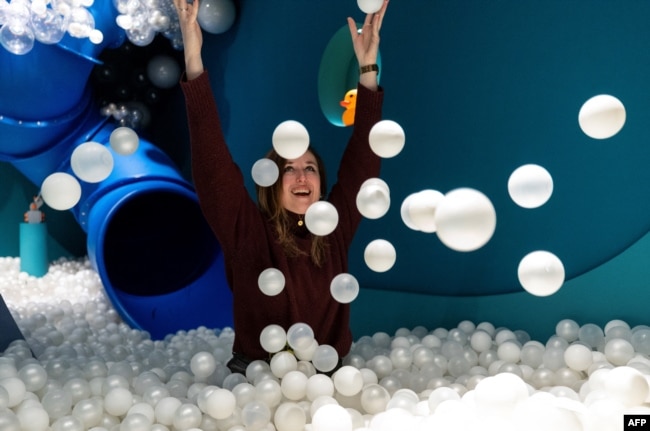A new museum of laughter in Croatia is offering to help people deal with the negativity of modern life.
Visitors to the HaHaHouse in the Croatian capital Zagreb walk into a little cloud of white smoke when they step inside. Its purpose is to blow away their worries before they climb into a “giant washing machine”.
Then they move down a twisting slide into a space filled with little white balls where their trip to a happier place starts.
Forty-three-year-old Andrea Golubic is the museum’s creator. Golubic said she got the idea during the COVID-19 pandemic. At that time, many people were feeling down, depressed and alone: “I realized that I had a mission — to heal people with laughter.”
The idea “came straight from the heart”, Golubic told the French News Agency (AFP). She had ideas for many of the museum elements in one day: “that’s how the HaHaHouse began.”
Golubic said a picture of her when she was seven-year-old inspired her. “I was constantly joking as a kid,” she added.
Visitors press a button to be “disinfected from negativity” as soon as they step inside the museum, which has eight interactive zones, or areas.
One has rubber chickens singing cheerfully. They sing songs like ABBA’s “Dancing Queen.” There is a karaoke room with distorted voices and a “Sumo Arena” for wrestling in puffed up clothes.
There is also some serious history of humor from ancient to modern times told through theatre, film or the internet.
The museum also explains different kinds of humor. These include word play, slapstick, dark humor and satire.

Inner child
Golubic said the HaHaHouse is popular with everyone from small children to older people. Adults say it is a good excuse to act like a child.
“All those who still feel a bit of childish joy and embrace their inner child, will recharge themselves,” she said.
Retiree Bruno Dadic told AFP he was pleased by his visit “as there is never enough humor in life.
“Laughter is a medicine for the soul,” he said.
Aleksandar Suka celebrated his fifth birthday with a visit. Visiting with his mother, the little boy said he liked lying on the “Bed of Nails” since they tickled him.
Singer Zorica Bucic, from the coastal town of Split, said the museum was just right for our times.
“Entering here is like entering childhood, being relieved of all problems,” she said. Bucic added that if you could come to museum often, you would not need to visit a psychologist.
Psychologist Petar Kraljevic told AFP that laughter is a kind of weapon which gives people strength to face their problems. He said that if doctors could advise their patients to have “three hours of laughter” a day, people would feel much better.
I’m John Russell.
Lajla Veselica reported this story for Agence-France Press. Jill Robbins adapted it for Learning English.
____________________________________________________
Words in This Story
museum –n. a building that holds many exhibits showing things related to a subject such as history, art or any other subject people are interested in
negativity – n. an attitude in which someone considers only the bad qualities of someone or something
twist – v. to curve or change direction suddenly
inspire – v. to make (someone) want to do something; to give (someone) an idea about what to do or create
interactive – adj. designed to respond to the actions or commands of a user
karaoke –n. a pastime in which people sing along with music of popular songs
slapstick – n. comedy that involves physical action (such as falling down or hitting people
satire – n. a way of using humor to show that someone or something is foolish, weak, or bad; humor that shows the weaknesses or bad qualities of a person, government, society, etc.
embrace – v. to accept (something or someone) readily or gladly
recharge – v. to rest and relax in order to regain your energy and strength
tickle – v. to make (someone) laugh by lightly touching a very sensitive part of the body with fingers, a feather, or the like
psychologist –n. a health specialist who is not usually a doctor but aims to treat people with mental or behavioral problems
